Australia on the Security Council: Strategies to advance the women, peace and security agenda

Australia’s bid for a seat on the Security Council gave prominence to our support for the Women, Peace and Security Agenda. This agenda is formed by a series of binding UN Security Council resolutions (UNSCR), namely UNSCR 1325 (2000), UNSCR 1820 (2008), UNSCR 1888 (2009), UNSCR 1889 (2009) and UNSCR 1960 (2010). The premise of the WPS agenda is that the experiences and needs of women and girls differ from those of men and boys in conflict and post-conflict situations, particularly in relation to human rights violations such as sexual and gender-based violence. UNSCR 1325 underlines the essential role of women in conflict prevention, management and resolution.
How should Australia seek to advance the Women, Peace and Security Agenda during its term on the Security Council, and especially during its two month-long sessions as President? The Secretary-General’s recent report states he remains most concerned about:
"The continued slow progress in women’s participation and representation in peace talks, in the inclusion of provisions for promoting women’s and girls’ rights in peace agreements and in increasing women’s representation in elected and appointed posts; the persistence of serious protection gaps, obstacles to women’s and girl’s access to justice and signs of the weakening of women’s rights in some contexts; and the slow change in the share of budgets allocated to women’s empowerment and gender equality in post-conflict contexts" (2 October 2012, S/2012/732, p. 22).
Dr Harris Rimmer will outline five possible diplomatic routes Australia could use to progress the agenda: the Presidential Statement following an open debate, a Leader’s Summit, informal side events or processes such as Arria formula meetings, country-based interventions, and ‘fireside chats’.
She will argue that Australia could focus on adding value and sharing good practice about a range of current issues, focused on the development of specific strategies to:
- promote gender-responsive transitional justice
- explore further ‘multidimensional’ peacekeeping, including the use of gender advisers and female mediators;
- ways to finance the contribution of women’s organisations to international peace and security and in particular conflict prevention;
- strategies for holding gains for women’s rights after mission drawdowns or transitions, such as in Afghanistan;
- analysis of regional 1325 efforts in the Asia-Pacific, including the Pacific Regional NAP; and
- strategies to address the security threats women and women’s human rights defenders face in conflict settings (noting the recent resolution in the UN Human Rights Council).
Dr Susan Harris Rimmer (BA[Hons]/LLB[Hons] UQ, SJD ANU) is the Director of Studies at the Asia-Pacific College of Diplomacy at the Australian National University. Susan is the author of Gender and Transitional Justice: The Women of Timor Leste (Routledge, 2010) and many refereed works, as well as contributions to the popular press. Susan was chosen as the winner of the Audre Rapoport Prize for Scholarship on the Human Rights of Women for 2006. She was previously the Manager of Advocacy and Development Practice at the Australian Council for International Development (ACFID), the peak body for Australian development non-governmental organisations, and is the Co-Chair of the ACFID University Network Committee. Susan has previously worked for the UN High Commissioner for Refugees, the National Council of Churches and the Parliamentary Library. She has been a board member of UN Women National Committee Australia and is a member of the National Committee of the voluntary non-governmental organisation Australian Lawyers for Human Rights, and the Executive Committee of Academics Stand Against Poverty (Australasia).
Contact: Martina.Fechner@anu.edu.au or call 6125 6281
Access: Free and open to the Public and no need to RSVP






